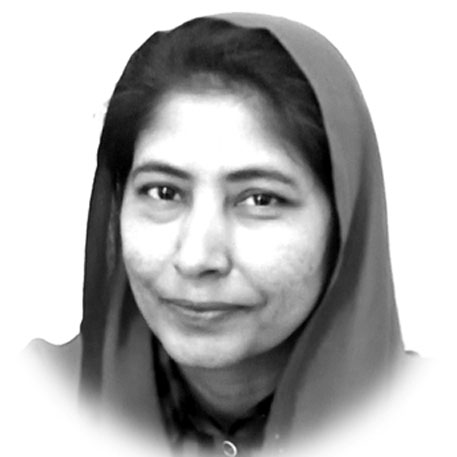Dr Nasreen Akhtar
THE concept of supremacy and prestige was significant in developing the nuclear weapons. As the history of international relations shows Albert Einstein in a letter to President F D Roosevelt in October 1939, informed him that Germans were taking steps to stockpile uranium and to replicate critical atomic experiments. Einstein’s letter persuaded President Roosevelt to allow Einstein to make an atomic bomb. Thus, the American Manhattan project was born which was never approved by the US Congress. Even the Vice President Harry Truman knew nothing about it.
The primary motivation for the US efforts to develop an atomic bomb was “the fear that Germany was making the same efforts and might take a lead. When Truman announced the Hiroshima bombing, he described the allied scientists as having been in a race of discovery against the Germans. He thanked providence the Germans had not won the race”. The US achieved peace but the quest of nuclear weapons accelerated in the world, Russia, UK, France and China acquired the technology to meet the challenges. China developed atomic bomb because it was under constant threat from the US in the 1950s “during the Korean War and the Taiwan’s crisis” the US General Mac Arthur had suggested the use of atomic bomb against China. US also had publicly threatened to invade China because of its help to North Korea. Knowingly China could retaliate the US did not use nuclear weapon.
Why did the states — developed and underdeveloped — acquire nuclear weapons? And how do they endure they did/do retain peace? Questions are not theoretical. Practically, the world has seen destruction or peace in nuclear environment. Presently, tension between India and Pakistan (over Kashmir issue) has brought the two nuclear neighbouring states very close to war. The use of nuclear weapons was averted twice- during Kargil war when India was losing and the third party, the US, played its role to deescalate the conflict. In the recent past post-Pulwama incident provided the justification to India’s political and security establishment to violate Pakistan’s territory which forced Pakistan to retaliate on February 27th — Pakistani air force shot down India’s planes and captured pilot, Abhinandan. But the Pakistani government decided to release him. The only purpose behind the ‘rational’ decision was to send a message for peace. Ironically, Prime Minister Modi and his comrades did not take it serious and the second term of Modi dissipated all hope for peace when his government abolished Article 370 and annexed disputed territory of Jammu and Kashmir.
South Asian nuclear environment under Modi is alarming and it would leave serious repercussions. One of the senior most ministers, Raj Nath, has categorically threatened to use nuclear weapons. He said, “India would rethink its policy of No First Use”. The responsible minister knows the consequences but irresponsible action and emotional approach is enough to destroy peace of the whole world. India initiated its nuclear program to emerge as a superpower. “Homi Bahbha put in Nehru’s head the idea that atomic bomb would put India in the group of superpowers”. It is unsure that India qualifies to become the superpower as Hinduatva state, or it would lose its status as the largest democratic secular state, after reviewing its policy vis-a-vis Pakistan.
We need to have a brief tale of the nuclear weapons. Since India exploded a nuclear device in 1974, the spectre of a nuclear arm race has loomed over the Indian subcontinent. India leads Pakistan in scientific expertise, potential to produce quantities of nuclear weapons and ability to deliver them. “In 1948, India set up its Atomic Energy Commission (AEC) under the Chairmanship of Dr Homi Bhabha and US, prompter of peace, supplied a light water power-reactor on commercial terms”. The international response to the Indian nuclear test was at best muted. The United States in fact continued to supply for the Tarapur power reactor till 1981. Even when the American supply was stopped in 1982 the US persuaded France to supply the same”.
India’s humiliation in the 1962 China-India border war precipitated a fear of China that dominates Indian strategic thinking to dominate the regional security order. India’s fear, intensified by Chinese 1964 nuclear test. Zulfikar Ali Bhutto, the Foreign Minister during President Ayub Khan’s regime, was much concerned about the security of Pakistan. His fears were reinforced after the 1965 Indo-Pak War. On 29 December 1966 in his speech in Larkana, Bhutto said, “We simply cannot take any solace in the attitude of states which are immune from a nuclear challenge from their neighbours and for whom this nightmare is never likely to arise, Pakistan’s position is entirely different because, for us, the nuclear threat is real and immediate”. In 1969, in an address in Larkana, Bhutto said,” Pakistan faces problems of an extraordinary magnitude. Pakistan will always find it difficult to quantitatively keep peace with India, but qualitatively we have maintained a balance in the past and will have to continue to maintain in the future for our survival. If India acquires nuclear status, Pakistan will have to follow suit even if it entails eating grass”.
In 1971, following the military defeat at the hand of India and the secession of East Pakistan, Bhutto came into power. Pakistan’s helplessness in face of Indian aggression in East Pakistan was hard to swallow for the Pakistani leadership, as well as the public. “They felt uncertain, about the integrity and security of their country in future”. Had the United States supported Pakistan during wars, Pakistan would not have acquired nuclear weapons. Bhutto wanted to restore the prestige of Pakistan, which was shattered in 1971”. Post 5th August nuclear environment in South Asia is critical. Pakistan’s concerns are being presented before the international community and organizations to deescalate the threat of nuclear war. Pakistan, as a responsible State, has moved swiftly on the diplomatic front to resolve long-standing Kashmir dispute. Hope sober voices would prevail.
—The writer is Assistant Professor, IIUI, Islamabad.








